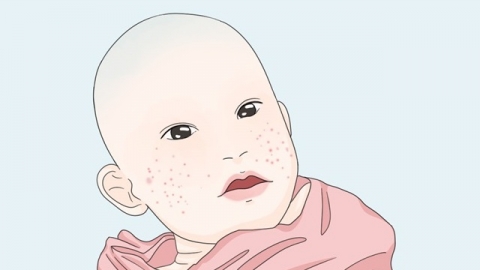What should I do if my baby has eczema?
Generally, the main treatment methods for infant eczema include daily care, skin moisturization, topical medication, oral medication, and avoidance of triggers. Specific details are as follows:
1. Daily Care
Parents should keep the affected skin area clean, gently washing with lukewarm water and avoiding excessive rubbing that may damage the skin barrier. Dress the baby in loose, breathable clothing made of pure cotton to reduce friction and irritation from fabrics.

2. Skin Moisturization
Maintaining skin hydration is an important measure for relieving infant eczema. Use medical-grade moisturizers specifically designed for children, such as Venoah Baby Soothing Moisturizing Cream, Yuzheng Infant Skin Barrier Repair Cream, or Qichu Baby Multi-Effect Ultra-Rich Face Cream. These moisturizers form a protective film on the skin surface, lock in moisture, repair damaged skin barriers, relieve dryness and itching, and reduce the risk of eczema worsening.
3. Topical Medication
If the baby's eczema symptoms are significant, topical medications may be used under medical guidance, such as calamine lotion, hydrocortisone butyrate cream, or desonide cream. Calamine lotion helps soothe and relieve itching caused by eczema. Hydrocortisone butyrate cream and desonide cream are mild corticosteroids that reduce skin inflammation and improve symptoms such as redness, swelling, and itching.
4. Oral Medication
When eczema-related itching severely affects the baby’s sleep or widespread rashes appear, oral medications may be prescribed, such as loratadine syrup, cetirizine hydrochloride drops, or chlorpheniramine maleate tablets. These antihistamines help suppress allergic reactions, reduce skin itching, alleviate discomfort, and support recovery from eczema.
5. Avoiding Triggers
Parents should identify and avoid potential factors that may trigger eczema in babies. If food allergies are confirmed, dietary adjustments should be made under medical supervision. Avoid using harsh soaps, shampoos, or laundry detergents. When outdoors, apply sunscreen and prevent prolonged exposure to strong sunlight to reduce the likelihood of eczema flare-ups or worsening.
In addition, parents should follow medical advice regarding proper medication use and care routines, and schedule regular follow-up visits. If the baby’s eczema symptoms continue to worsen, or if skin breaks or infection occur, prompt medical attention is necessary to adjust the treatment plan.





